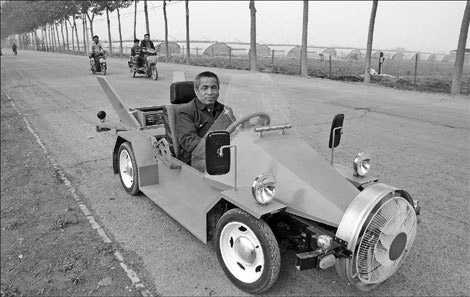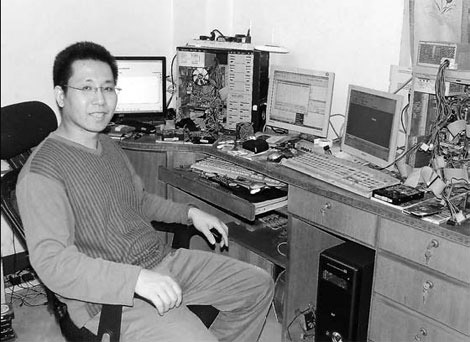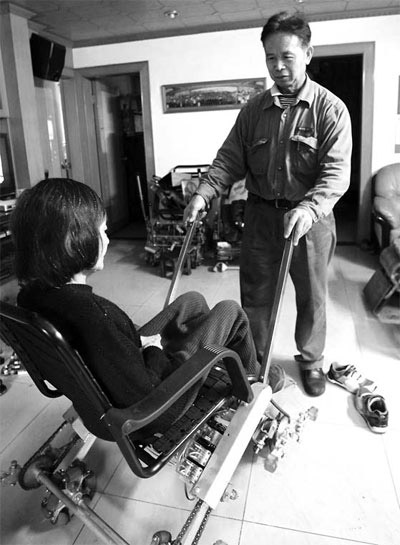The drive to create
Updated: 2012-05-07 15:06
By Wang Kaihao (China Daily)
|
||||||||
 |
|
Tang Zhenping drives his electric vehicle in Banjiehe village, Tongzhou district, Beijing. Wu Changqing / For China Daily |
 |
|
Lin Bin at his hard drive repair store in Jiangmen, Guangdong province. Provided to China Daily |
 |
|
Liu Tie'er invented a wheelchair that can climb stairs, for his disabled wife. Zou Zhongpin / China Daily |
Is alive and well in China, where numerous TV programs and Internet sites popularize the latest devices produced by grassroots inventors. Wang Kaihao reports in Beijing.
If you enter the words cotton candy and hard drive in a Chinese search engine or micro blog site, you will get numerous results on how to turn a hard disc drive into a cotton candy machine. These show how a round metal tin filled with sugar can be set up on a hard drive, connected by six bicycle spokes. A box containing solid alcohol is set under the metal tin and when the sugar melts and is spun by the drive, cotton candy is created.
Its inventor, Lin Bin, a 39-year-old known as "Geek Mr Lin", has been running a hard drive repair store in Jiangmen, Guangdong province, for 12 years.
"I didn't expect to become a celebrity," he giggles. "I just made the machine for fun. My 10-year-old daughter always wants cotton candy when we go to the park, so she inspired me."
Lin has come up with numerous inventions over the years, including a scoring system in 2008 for Laser Strike - an outdoor team player game - and an air-disinfector made during the SARS outbreak in late 2002.
He's just one of many inventors who are popularizing their amazing creations across the country and are being feted on TV shows and blogs.
Tang Zhenping, 55, lives in Banjiehe village, Tongzhou district, Beijing. In April, he called up a newspaper to show off an electric vehicle he made that can reach speeds of up to 70 kph, which got national attention.
The car's generator provides power derived from inertia when the car starts or stops, while a fan generates power as it rotates in the air currents when running at high speeds. It also has a pair of "shark fins" that Tang says were inspired by old jets.
"It was a longtime dream come true," Tang says of his invention. "I had wanted to create a car since high school."
Now, Tang hopes to collaborate with a major manufacturer.
Bian Zhai, an official from Bayannur, the Inner Mongolia autonomous region, has shown an interest in Tang's eco-friendly car and wants to introduce it to his home city.
He says he plans to visit Beijing and determine whether the technology is practical, as "few ideas are mature".
China Central Television started the program I Love Inventions, in 2009, to build a bridge between inventors and businesses.
For instance, Liu Tie'er, 70, a retiree from Guangdong's provincial capital Guangzhou, appeared on the show in late March to show off his wheelchair that can climb stairs.
He has designed 60 devices since the 1970s and has been granted 18 national patents since the patent law passed in 1984, adding he has not experienced any infringements to date.
But not every inventor has been so lucky.
"The patent registration system in China is not as complete as copyright protection," says Yang Yifan, a Beijing-based lawyer who specializes in intellectual property rights cases. "This may give big corporations the space to copy individual's creations.
"Many grassroots inventors are unaware of the legal pitfalls and don't apply for patents in time, and if they do apply, their inventions may be worded so badly it could cause trouble later."
Car inventor Tang claims someone has registered a similar idea to his own.
This situation has discouraged many grassroots inventors. According to 2010 statistics from China Association of Inventions, 40.6 percent of patents are applied for by amateurs, which is 10 percent less than five years ago.
This fact prompted seven grassroots inventors to gather in Beijing on April 18 to form a rights protection league.
"As individual inventors we are weak because our money, energy and knowledge is sometimes lacking," the lawyer Yang says. "But, this is a positive first step."
"This league will be a community for all inventors," says the initiator of the campaign, 49-year-old Xu Bao'an from Zibo, Shandong province.
"We want to create a united force to claim our fortunes and ensure our rights," Xu says.

 'Taken 2' grabs movie box office crown
'Taken 2' grabs movie box office crown
 Rihanna's 'Diamonds' tops UK pop chart
Rihanna's 'Diamonds' tops UK pop chart
 Fans get look at vintage Rolling Stones
Fans get look at vintage Rolling Stones
 Celebrities attend Power of Women event
Celebrities attend Power of Women event
 Ang Lee breaks 'every rule' to make unlikely new Life of Pi film
Ang Lee breaks 'every rule' to make unlikely new Life of Pi film
 Rihanna almost thrown out of nightclub
Rihanna almost thrown out of nightclub
 'Dark Knight' wins weekend box office
'Dark Knight' wins weekend box office
 'Total Recall' stars gather in Beverly Hills
'Total Recall' stars gather in Beverly Hills
Most Viewed
Editor's Picks

|

|

|

|

|

|
Today's Top News
Health new priority for quake zone
Xi meets US top military officer
Japan's boats driven out of Diaoyu
China mulls online shopping legislation
Bird flu death toll rises to 22
Putin appoints new ambassador to China
Japanese ships blocked from Diaoyu Islands
Inspired by Guan, more Chinese pick up golf
US Weekly

|

|






